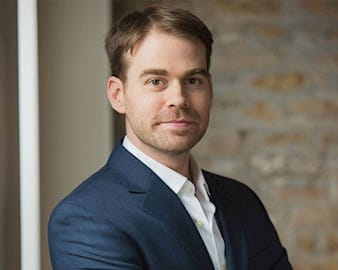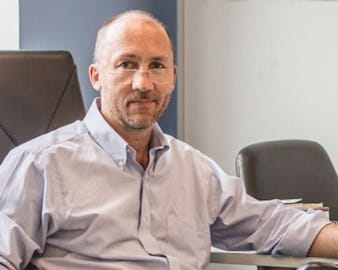Meet 4 Evening/Weekend Entrepreneurs in the 1st Alumni New Venture Challenge
Evening and Weekend MBA alumni are participating in UChicago’s first ever Alumni New Venture Challenge.
Alumni share their stories and advice for budding entrepreneurs here.
- By
- March 22, 2019
- Entrepreneurship
Chicago Booth’s Polsky Center has been running its New Venture Challenge (NVC), one of the top business accelerators in the US and open to all Booth students, since 1996. This year marks the start of the first ever Alumni NVC. Evening/Weekend alumni make up nine of the 35 teams and are competing in four of the five regions. Meet two of our alumni here. Two more alumni from the East Coast and Asia are profiled here.

Dylan Hall, Evening MBA Alum, Safe Rate, Midwest
Safe Rate mitigates risks associated with mortgage borrowers and investors by offering a mortgage that works with your financial situation.
I did not know I wanted to be an entrepreneur. I was motivated by problems, I wanted to be somewhere where I felt my success would be measured. If you’re going into an uncertain situation you have to create structure and then ultimately create value.
Booth gave me access to the idea of entrepreneurship. I think part of the reason you don’t think about entrepreneurship is you don’t see other people doing it. Being in class at Booth and hearing entrepreneurs speak was really enabling for me. It gave me the confidence to do this and started it for me. Once my co-founder and wife Shima and I started speaking to people in the mortgage market from borrowers to investors, we came to understand some of the difficulties in implementing a shared responsibility mortgage. We’ve had to figure out how to make the investors, borrowers and regulators happy and how we make money out of all of this. Now that I think we can come to market our growth might be more feasible because we’ve done so much of this front load of work.
When you show a borrower that the payment goes down, when the house price goes down, it connects to this idea of fairness. That’s really what’s kept us going, the world should be this way. Some people will still make their mortgage payment when their home isn’t worth as much as it used to be- we’re getting them protection and saying, we’re going to lower your monthly payment because it’s not your fault, you’re a good borrower. From a financial point of view it almost makes sense for you to walk away, but you’re willing to pay your mortgage because you value your home so much. We’re giving them payment relief and they can still contribute money into their local economy. As people consume in those areas, you start to get the rebound and you get out of this vicious cycle. We’re trying to turn this into a movement of sorts and say this is the way home financing should be.
In the course of our networking, we’ve been offered consulting work and projects we can slice up, so it’s become a small family business at this point. One hard part about entrepreneurship is you’re laser focused on your project but then you may miss out on other opportunities. One thing I don’t like about Silicon Valley when I did an edtech start-up there- they were like you have to do this one thing and it has to be your focus and I remember thinking well I have to pay my student loans. I do think there needs to be more stories about how most people do entrepreneurship because you have competing requirements and someone doesn’t just come in and give you a million dollars, you have to find it on your own. You have to believe in yourself. Professor Waverly Deutsch said if you’re the one who’s so passionate about it, you’re the right one to sell it. If I’m the one who believes in it, then ultimately I’m the one who can make it happen.

Yuri Nikolsky, Weekend MBA Alum, SantaMaria Health & Longevity, West Coast
SantaMaria Health & Longevity is a network of walk-in medicinal spas modeled after European health resorts.
I always wanted to be a scientist and came to the University of Chicago as a postdoc after getting my Ph.D. in molecular biology. Instead, I evolved into a serial entrepreneur in life sciences, starting from my first year at Booth. My most successful venture, GeneGo, was a technology leader in systems biology and precision medicine; it was acquired by Thomson Reuters in 2010. Another genomics company I co-founded, Igenbio, is still up and running in Chicago.
SantaMaria Health Resorts is a different kind of business; it’s rooted in our personal story. My wife was diagnosed with chronic Lyme disease, and I discovered that this is a major healthcare issue in the US with hundreds of thousands of new cases a year. We realized there are few treatment options in this country for Lyme; moreover, the US healthcare system is not designed for chronically ill patients. Historically, the American Medical Association encourages doctors to practice only chemistry-based pharmacology and surgery, both poorly suitable for preventive care and chronic conditions. Research and practice in alternative, physical approaches are much more advanced in Europe, where preventive care is delivered through a universe of medicinal spa and resorts. In fact, many Americans travel abroad for such therapy. We saw a market opportunity here.
We decided to bring European medicinal spa technologies close to home, launching a network of specialized walk-in spa clinics. Essentially, we re-packed the existing procedures and adjusted the offering for the US market. We have seen and experienced the positive effect these treatments have on chronic diseases, especially Lyme disease, arthritis and Metabolic Syndrome. We are planning to open our first medical spa in Tijuana this summer. Baja is a major and fast growing hub of medical tourism; with low costs but high level of education and experience by local doctors. Our long term vision is to build a chain of such clinics, like a Starbucks of healthcare, specifically targeting areas with American and Canadian medical tourism. One day, we hope to expand in the US mainland as well.
My biggest piece of advice to entrepreneurs is to determine what you are and what you are not.